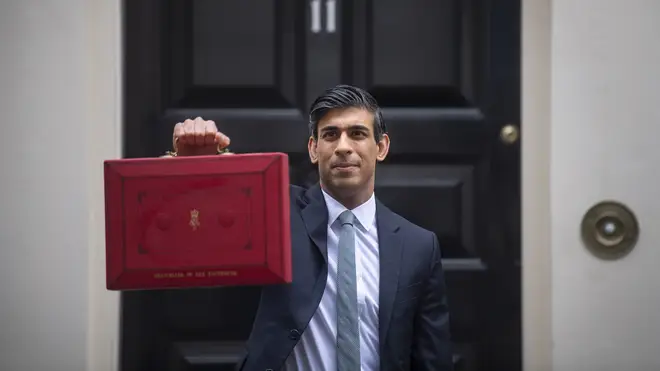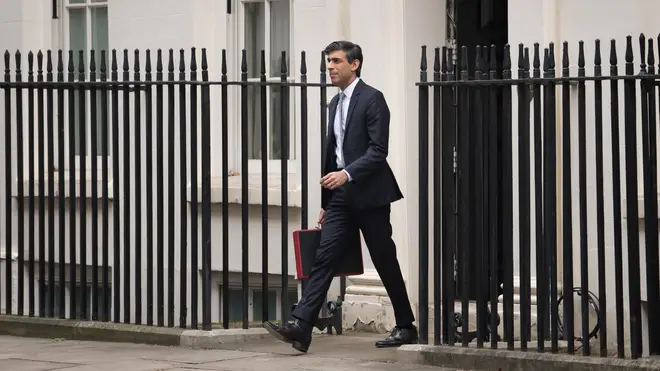
Iain Dale 10am - 1pm
3 March 2021, 13:20 | Updated: 3 March 2021, 21:00
Rishi Sunak: Economy will recover quicker than expected
Rishi Sunak today unveiled his Spring Budget aimed at getting the nation through the coronavirus crisis, as he said Covid-19 is expected to cost the UK £407 billion.
In a series of sweeping measures trying to keep the country going as it approaches the anniversary of the first Covid lockdown, The Chancellor said it will take the UK and the whole world a "long time to recover from this extraordinary economic situation", telling MPs: "But we will recover."
The Chancellor said more than 700,000 people have lost their jobs since March 2020 and the economy has shrunk by 10%, the largest fall in more than 300 years.
Speaking in the House of Commons, Mr Sunak acknowledged Covid-19 has "fundamentally altered" our way of life, adding: "Much has changed, but one thing has stayed the same: I said I would do whatever it takes - I have done and I will do."
The Key points of the Chancellor's statement today include:
However he was facing accusations of a 'stealth' rise in income tax by raising the personal income tax threshold to £12,750 and keeping it frozen until April 2026.

Covid-19 has lead to the Government engaging in the biggest peacetime wartime borrowing spree in the UK's history, a "record" £355 billion, the equivalent of 17% of the UK's national income.
Sunak told MPs the total Covid-19 support package amounted to £352 billion.

Business owner Carol Slark speaks to LBC following Rishi Sunak's Budget announcement
He said: "Coronavirus has caused one of the largest, most comprehensive and sustained economic shocks this country has ever faced and, by any objective analysis, this Government has delivered one of the largest, most comprehensive and sustained responses this country has ever seen.
"Next year, as we continue our unprecedented response to this crisis, borrowing is forecast to be £234 billion, 10.3% of GDP - an amount so large it has only one rival in recent history - this year."
The Chancellor went on: "The amount we've borrowed is only comparable with the amount we borrowed during the two world wars. It is going to be the work of many governments, over many decades, to pay it back.

Rishi Sunak summarises Government support during the Covid crisis
"Just as it would be irresponsible to withdraw support too soon, it would also be irresponsible to allow our future borrowing and debt to rise unchecked. When crises come, we need to be able to act. And we need the fiscal freedom to act. A freedom that you only have if you start with public finances in a good place."
Rishi Sunak said borrowing costs are "affordable right now" but warned interest rates and inflation may not stay low.
He told MPs: "This Budget is not the time to set detailed fiscal rules, with precise targets and dates to achieve them by - I don't believe that would be sensible.
"But I do want to be honest about what I mean by sustainable public finances, and how I plan to achieve them."

Chancellor pledges not to raise rates of income tax, NI or VAT
But it wasn't all bad news.
The Office for Budget Responsibility (OBR) predicts economy will return to pre-Covid levels by the middle of 2022, six months earlier than previously thought, Sunak said.
He also said this year's growth is expected to be 4% after a bumper roll out of the vaccine which hopes to get the UK back to some form of normal by the end of June.
However, Sunak warned the economy will be 3% smaller than it would have been without Covid in five years time, hinting tax rises could be in store in years to come.

- The rate of corporation tax, paid on company profits, will increase to 25% in April 2023 - but small businesses with profits of £50,000 or less will continue to be taxed at 19%.
- There will be a "super deduction" for companies when they invest, reducing their tax bill by 130% of the cost for the next two years.
- Rates of income tax, national insurance and VAT kept at the same level but personal tax thresholds will be frozen from April 2026.
- The inheritance tax threshold and the pensions lifetime allowance will be maintained at their current levels, along with the annual exempt amount in capital gains tax, until April 2026 and, for two years from April 2022, the VAT registration threshold.
- The furlough scheme will be extended to the end of September, as will support for the self-employed.
- The Universal Credit uplift of £20 a week will continue for a further six months, well beyond the end of this national lockdown.
- A new restart grant will start in April to help businesses reopen, with £5 billion of funding.
- The Chancellor confirmed an additional £1.6 billion for the coronavirus vaccine rollout and to "improve future preparedness".
- The business rates holiday for the retail, hospitality and leisure sectors will continue until the end of June, and will be discounted by two thirds for the remaining nine months of the year.
- The 5% reduced rate of VAT for the tourism and hospitality sector will be extended for six months to the end of September, with an interim rate of 12.5% for another six months after that.
- The stamp duty cut will continue until the end of June, with the nil rate band set at £250,000 - double its standard level - until the end of September.
- The Chancellor said coronavirus has caused one of the "largest, most comprehensive and sustained economic shocks this country has ever faced".
- The Office for Budget Responsibility (OBR) is now forecasting "a swifter and more sustained recovery" than they expected in November, predicting the economy will be 3% smaller than it would have been in five years' time because of the coronavirus crisis.
- But the economy, according to the OBR, is forecast to grow this year by 4%, by 7.3% in 2022, then 1.7%, 1.6% and 1.7% in the last three years of the forecast.
- Borrowing is forecast to be £234 billion next year - 10.3% of gross domestic product (GDP), a measure of the size of the economy - but will fall to 4.5% of GDP in 2022-23, 3.5% in 2023-24, then 2.9% and 2.8% in the following two years.
- The measures to support the economy amounted to £65 billion over this year and next, taking the total Government support to £407 billion over that period, Mr Sunak said.